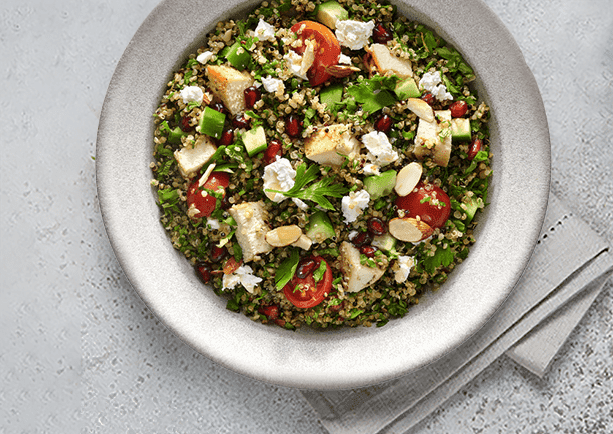30-Day Hormone Balance Meal Plan

Imagine waking up each day feeling energised, focused, and balanced. Your skin glows, your mood is stable, and your body feels in sync. This isn't just a dream—it's the potential reality of achieving hormonal balance through diet. Hormones play a crucial role in our overall health, influencing everything from our metabolism and mood to our sleep and reproductive health. When these chemical messengers are out of whack, the effects can be far-reaching and disruptive.
This is where a well-structured hormone balance meal plan comes into play. We can support our body's natural hormone production and regulation by selecting the right foods and nutrients. Over 30 days, this meal plan will guide you through a series of balanced, nutrient-rich meals designed to help harmonise your hormones and improve your overall well-being.
This plan incorporates a variety of whole foods, lean proteins, healthy fats, and low-glycemic carbohydrates to give your body the essential building blocks it needs. Along with proper hydration and mindful eating practices, you'll find that achieving hormonal balance is possible but also delicious and satisfying. So, let's embark on this journey to better health, one meal at a time.
What is Hormonal Balance?
Hormonal balance refers to the state where the body produces and maintains the optimal levels of hormones needed for its functions. This equilibrium ensures that every system in the body operates smoothly. Key hormones like insulin, cortisol, estrogen, testosterone, and thyroid must be harmonious to function optimally.
Common Signs of Hormonal Imbalance
Recognising the signs of hormonal imbalance is the first step towards addressing it. Some common indicators include:
- Fatigue and Low Energy: Persistent tiredness despite adequate rest.
- Weight Fluctuations: Unexplained weight gain or difficulty losing weight.
- Mood Swings and Irritability: Emotional instability and heightened sensitivity.
- Sleep Disturbances: Trouble falling or staying asleep.
- Digestive Issues: Bloating, constipation, or diarrhoea.
- Skin Problems: Acne, dryness, or excessive oiliness.
How Diet Impacts Hormone Levels
Diet plays a significant role in maintaining hormonal balance. The foods we consume provide the building blocks for hormone production and regulation. For example:
Protein: Essential for the production of hormones like insulin and growth hormone. Incorporating adequate protein helps maintain muscle mass and supports metabolic functions.
Healthy Fats: Crucial for synthesising hormones, particularly steroid hormones like estrogen and testosterone. Sources include avocados, nuts, seeds, and oily fish.
Carbohydrates: Influence insulin production, a hormone vital for blood sugar regulation. Choosing low-glycemic, high-fibre carbs helps maintain stable blood sugar levels, preventing insulin spikes.
Micronutrients: Vitamins and minerals like vitamin D, zinc, and magnesium support hormone synthesis and function.
Hormone Balance Meal Plan
Week 1: Detox and Reset
Focus: Whole, unprocessed foods.
Objective: Start your journey towards hormonal balance by eliminating processed foods and toxins from your diet.
Day: 1- 4
Breakfast: Spinach and Feta Omelet
-
2 eggs, 1 cup fresh spinach, 1/4 cup feta cheese, 1 tablespoon olive oil.
Lunch: Grilled Chicken Salad
-
Grilled chicken breast, mixed greens, cherry tomatoes, cucumbers, and a lemon-olive oil dressing.
Dinner: Baked Salmon with Steamed Broccoli
-
1 salmon fillet, steamed broccoli, quinoa.
Snacks: Apple slices with almond butter.
Day: 5- 7
Breakfast: Greek Yogurt Parfait
- Greek yogurt, mixed berries, chia seeds, flaxseeds, honey.
Lunch: Lentil Soup
- Lentils, carrots, celery, onions, vegetable broth.
Dinner: Turkey and Vegetable Stir-fry
- Ground turkey, bell peppers, snap peas, carrots, brown rice.
Snacks: Handful of almonds.
Breakfast: Oatmeal with Fresh Fruits
- Oatmeal, sliced bananas, strawberries, chia seeds.
Lunch: Quinoa and Black Bean Salad
- Quinoa, black beans, corn, avocado, cilantro-lime dressing.
Dinner: Grilled Shrimp and Vegetable Skewers
- Shrimp, bell peppers, zucchini, cherry tomatoes, wild rice.
Snacks: Carrot sticks with hummus.
Hydration Tips: Aim for 8-10 glasses of water daily. Include herbal teas and infused water with lemon or cucumber for variety.
Week 2: Boosting Nutrient Intake
Focus: Nutrient-dense foods to support hormonal health.
Day: 8 -11
Objective: Incorporate foods rich in vitamins and minerals to enhance hormonal function
Breakfast: Smoothie Bowl
- Spinach, banana, almond milk, chia seeds, walnuts.
Lunch: Chickpea and Avocado Wrap
- Whole-grain wrap, mashed chickpeas, avocado, mixed greens.
Dinner: Grilled Chicken with Roasted Vegetables
- Chicken breast, sweet potatoes, Brussels sprouts.
Snacks: Greek yogurt with honey and walnuts.
Day: 12- 14
Breakfast: Scrambled Eggs with Veggies
- Eggs, spinach, bell peppers, onions.
Lunch: Tuna Salad
- Tuna, mixed greens, cherry tomatoes, olives, olive oil dressing.
Dinner: Baked Cod with Quinoa
- Cod fillet, quinoa, sautéed spinach.
Snacks: Mixed nuts.
Importance of Fiber: Fiber aids digestion and helps maintain stable blood sugar levels, which is crucial for hormonal balance. Incorporate plenty of vegetables, fruits, and whole grains.
Week 3: Stabilizing Blood Sugar Levels
Focus: Avoid blood sugar spikes.
Day: 15- 18
Objective: Maintain stable blood sugar levels through balanced meals.
Breakfast: Avocado Toast with Poached Egg
- Whole-grain bread, avocado, poached egg.
Lunch: Grilled Chicken Caesar Salad
- Grilled chicken, romaine lettuce, Parmesan, light Caesar dressing.
Dinner: Zucchini Noodles with Pesto
- Zucchini noodles, homemade pesto, cherry tomatoes.
Snacks: Cottage cheese with cucumber slices.
Day: 19- 21
Breakfast: Smoothie with Protein Powder
- Spinach, berries, almond milk, protein powder.
Lunch: Turkey Lettuce Wraps
- Ground turkey, lettuce leaves, diced tomatoes, onions.
Dinner: Stuffed Bell Peppers
- Bell peppers, quinoa, black beans, corn, spices.
Snacks: Hard-boiled eggs.
Role of Protein: Protein helps maintain stable energy levels and supports muscle repair and growth. It is found in lean meats, fish, eggs, dairy, legumes, and nuts.
Week 4: Sustaining Hormonal Balance
Focus: Long-term strategies for maintaining hormonal health.
Day: 22 -26
Objective: Adopt a balanced and varied diet for sustained hormonal health.
Breakfast: Chia Seed Pudding
- Chia seeds, almond milk, fresh berries.
Lunch: Mediterranean Salad
- Mixed greens, cherry tomatoes, cucumbers, olives, feta cheese, olive oil dressing.
Dinner: Grilled Salmon with Asparagus
- Salmon fillet, asparagus, brown rice.
Snacks: Celery sticks with peanut butter.
Day: 27- 20
Breakfast: Whole-Grain Pancakes with Berries
- Whole-grain pancake mix, fresh berries, and a dollop of Greek yogurt.
Lunch: Lentil and Vegetable Soup
- Lentils, carrots, celery, spinach, vegetable broth.
Dinner: Chicken and Veggie Stir-fry
- Chicken breast, bell peppers, broccoli, snap peas, brown rice.
Snacks: Fresh fruit salad.
Importance of Regular Meal Times: Eating at regular intervals helps maintain stable blood sugar levels and prevents overeating. Avoid high-calorie snacks by choosing nutrient-dense options like fruits, nuts, and yogurt.
Tips for Success
Embarking on a 30-day hormone balance meal plan requires dedication and mindful preparation. To help you achieve the best results, here are some tips for success:
- Plan and Prep Your Meals in Advance
Meal planning and preparation are key to staying on track with your hormone balance meal plan. Plan your weekly meals and snacks, make a detailed grocery list, and prepare ingredients in advance. This will save you time and reduce the temptation to reach for unhealthy options.
- Stay Consistent with Meal Timing
Eating at regular intervals helps maintain stable blood sugar levels and supports hormonal balance. Spaced evenly, aim for three balanced meals and two healthy snacks daily. Consistent meal timings prevent large gaps between meals that can lead to energy dips and cravings.
- Focus on Balanced Macronutrients
Ensure each meal includes a balance of proteins, healthy fats, and low-glycemic carbohydrates. This combination helps regulate blood sugar levels, supports hormone production, and keeps you feeling full and satisfied. Include a variety of nutrient-dense foods to meet your body's needs.
- Hydrate Properly
Staying hydrated is crucial for overall health and hormone function. Aim to drink at least eight glasses of water daily, and consider herbal teas or infused water for added variety. Proper hydration helps transport nutrients, supports detoxification, and maintains cellular function.
- Incorporate Physical Activity
Regular exercise complements your hormone balance meal plan by helping to regulate hormones, reduce stress, and improve overall well-being. Aim for at least 30 minutes of moderate physical activity most days of the week. Activities like walking, yoga, and strength training are great options.
- Get Adequate Sleep
Quality sleep is essential for hormone regulation. Aim for 7-9 hours of uninterrupted sleep each night. Establish a relaxing bedtime routine to enhance sleep quality, avoid screens before bed, and create a sleep-conducive environment.
- Manage Stress
Chronic stress can disrupt hormonal balance. Incorporate stress-reducing activities into your daily routine, such as meditation, deep breathing exercises, or hobbies you enjoy. Finding healthy ways to manage stress supports overall hormonal health.
Conclusion
Embarking on a 30-day hormone balance meal plan is a powerful step towards improving your overall health and well-being. Focusing on nutrient-rich foods, balanced macronutrients, and proper hydration can support your body's natural hormone production and regulation. Here's to a healthier, more balanced you!
Find your balance with Delicut's Hormone Balance Meal Plan. We offer a fantastic 15% discount on your first order. Our meal plan is carefully crafted to support hormonal balance, with delicious meals designed to nourish your body and regulate hormone levels. By focusing on specific nutrients and healthy eating patterns, this plan can help you achieve optimal hormone health. Take control of your hormones and try our Hormone Balance Meal Plan!
FAQs
1. How can this meal plan help regulate hormone levels?
This meal plan helps regulate hormone levels by providing a balanced intake of proteins, healthy fats, and low-glycemic carbohydrates, which support hormone production and balance. It also emphasises regular meal timings and nutrient-dense foods to stabilise blood sugar and energy levels.
2. What types of foods are included in a hormone-balance meal plan?
A hormone-balanced meal plan includes lean proteins, healthy fats, whole grains, and plenty of fruits and vegetables. It focuses on nutrient-dense, whole foods that support overall health and hormonal function.
3. Can I customise this meal plan based on my specific hormonal issues?
Yes, the meal plan can be tailored to address specific hormonal issues by adjusting food choices and nutrient focus. Consulting with a healthcare professional or dietitian can help create a personalised plan that meets your needs.
4. How often should I expect to see results from following this meal plan?
Results can vary, but many people start to notice improvements in energy levels, mood, and overall well-being within a few weeks. Consistency and adherence to the meal plan are key to achieving and maintaining these benefits.
5. What beverages are recommended or discouraged for hormone balance?
Recommended beverages include water, herbal teas, and green tea, which support hydration and hormone health. Sugary drinks, excessive caffeine, and alcohol should be limited as they can disrupt hormonal balance.
Trending Searches:
Meal Plan Dubai | Meal Plans Abu Dhabi | Meal Plan Ajman | Meal Plan Al In | Meal Plan Sharjah | Meal Plan Subscription
Read More
30-Day Enhanced Athletic Performance Meal Plan
5-Day Dual Efficient Metabolism Meal Plan for Beginners
10-Day Traditional Indian Meal Plan for Expats
Related Blogs
The Burnout Diet
Jan 30, 2026 | 8The mental load of “What should I eat today?"
Jan 22, 2026 | 8The real glow-up starts with your gut health
Jan 14, 2026 | 8Healthy food that doesn’t taste like “Diet Food”
Jan 17, 2026 | 8Why do most people in the UAE get their calories wrong
Dec 8, 2025 | 6DASH Diet Meal Plan
Nov 11, 2025 | 8Fatty Liver Meal Plan
Oct 31, 2025 | 8Pregnancy Diet Meal Plan
Oct 27, 2025 | 82000 Calorie Meal Plan
Oct 1, 2025 | 8Intermittent Fasting Diet Plan
Sep 5, 2025 | 8






